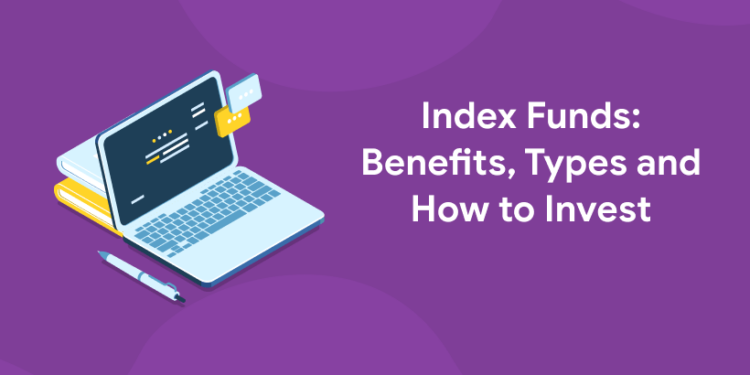Table of Contents
Mutual funds come in a variety of forms and are sold in the market. An index fund is one of the specialist categories of mutual funds. These funds mirror the portfolio of a certain index, such as the most widely used indexes in India, the BSE Sensitive index (Sensex), NSE 50 index (Nifty), etc. Securities with the same weighting as those in an index are purchased by index funds. According to the rise or fall in the index, the NAV will also rise or fall. Due to various characteristics are known as “tracking error,” it does not, however, reflect the index exactly by the same percentage. In contrast to actively managed funds, index funds keep track of an index’s performance in the background. These resources are not intended to outperform the market. The only purpose is to replicate the output of the index. The index funds are substantially less expensive than other schemes since the portfolio of index funds is not actively managed and the fund house does not buy and sell shares to achieve profits.
Master stock trading with us. Enroll now for a free demo!
What Is an Index Fund?
A mutual fund or exchange-traded fund (ETF) called an index fund holds all (or a representative sample) of the securities in a certain index to closely replicate the performance of that benchmark. There are indexes—and index funds—for almost every market and investment strategy you can imagine, with the S&P 500 being perhaps the most well-known of them all. You can purchase index funds directly through an index-fund provider, such as BlackRock or Vanguard, or your brokerage account. When you invest in an index fund, you obtain a variety of securities in one simple, affordable transaction. The exposure to thousands of stocks offered by some index funds reduces your overall risk through thorough diversification. You can create a portfolio that matches your preferred asset allocation by investing in several index funds that track various indices. You might, for instance, allocate 60% of your funds to stock index funds and 40% to bond index funds.
Join to know more about index funds in India
Index funds: Benefits, Types and How to Invest
1: What is a stock?
Index funds are quickly rising in popularity as a means of investment. This paragraph aims to aid you in understanding index funds better.
Benefits of Investing in Index Funds
The following are some benefits that index funds enjoy:
- Low costs: An effective staff of research analysts are not required to assist fund managers in selecting the ideal companies because an index fund mirrors its underlying benchmark. Additionally, there is no stock trading going on. All of these elements contribute to an index fund’s reduced managing costs.
- Unbiased investment: An automated, law-based investment strategy is used by index funds. The amount to be invested in index funds of different securities is specified in the fund manager’s mandate. By doing this, human judgement or prejudice in making investment decisions is eliminated.
- Exposure to a large market: The portfolio is diversified across all industries and equities when money is invested in a ratio akin to that of an index. As a result, an investor can use a single index fund to capture the likely returns on the broader sector of the market. If you choose to invest in the Nifty index fund, for example, you will have access to 50 securities distributed over 13 different industries, from pharmaceuticals to financial services.
- Tax Benefits of Index Fund Investing: Due to their passive management, index funds often have a low turnover or few trades made by a fund manager in a given year. Less trading means that the unitholders enjoy less capital appreciation dividends.
- More manageable: Index funds are simpler to manage since fund managers don’t have to worry about how the market is treating the stocks that make up the index. The portfolio only has to be periodically rebalanced by fund management.
Join to learn about index funds returns in the stock market
Types of Index Funds
There are numerous index funds available. Here’s everything you need to know:
- Broad market: An index designed to capture a large segment of the market. The lowest expense ratios are often found in large market index funds. Broad index fund asset sales are extremely tiny and highly tax-efficient. Investors who seek a basket of different shares or bonds should consider a broad market index fund.
- Global index funds: These funds give you exposure to other countries. In developing markets or frontier markets, investors can buy funds that keep an eye on indices that are not tied to a specific geographic area.
- Market capitalization: A broadened exposure to small and medium-sized businesses might be advantageous for investors with a long investment horizon. This goal can be accomplished through index funds based on market capitalisation.
- Bond-based index funds: By using bond index funds, you may keep a healthy balance of short-, intermediate-, and long-term bond maturities that produce consistent income.
- Earnings-based: Index funds may also operate based on a company’s profits or earnings. Growth indexes and value indexes are the two categories of indices connected to companies. Businesses that are anticipated to create profits more quickly than their competitors make up growth indices. Stocks in value indices are those that are trading for less than the company’s earnings.
Master stock trading with us. Enroll now for a free demo!
How to Invest in Index Funds?
You have two options if you want to invest in a mutual fund: directly or through an agent. Direct allows you to invest both online and offline. However, if you’re dealing with an investor, be sure they have an AMFI Registration Number and are registered with the Association of Mutual Funds in India. Without using a distributor, investors can also invest directly in index funds. The investor needs a financial advisor for investments made through the direct plan but is exempt from paying distributors any commissions. As there is no commission paid, this optimises the returns. The mutual fund website or a branch location are also options for investors who want to invest directly with the mutual fund. Through the agents and distributors that offer these services, forms can be placed with mutual funds. Investors should consider the index fund’s track record before investing. All mutual funds must label their programmes based on the following criteria, per SEBI regulations.
- The nature of the plan will determine whether it aims to generate wealth or stable income over a given time frame (short, medium, or long term).
- A one-line summary of the investment goal is followed by the type of asset the investor is investing in (equity or debt).
- Risk level as shown by the following visual metre: low, moderately low, moderate, moderately high and high.
Before purchasing index funds, an investor should consider product labelling.
Click to learn more topics like index funds returns from the basics of the stock market
Who Should Make Investments in Index Funds?
Depending on your investing horizon, objectives, and risk tolerance, you should invest in mutual funds. For risk-averse investors, index mutual funds are appropriate. Such assets don’t need in-depth investigation and tracking. For instance, you can choose a Nifty or Sensex index fund if you want to invest in stocks but do not want to expose yourself to the dangers involved with actively managed equity funds.
What Factors Should an Investor Consider?
Before choosing to invest in index funds, you should think about the following characteristics:
Index Funds Returns: Index funds seek to match the market index’s performance. They do not attempt to outperform actively managed funds. Due to tracking issues, the returns generated could occasionally fall short of those of the underlying index. The index fund will perform better the lower the errors are.
Risk tolerance: Index funds are less vulnerable to risks and volatility associated with equities because they represent a specific market index. To achieve the best profits during a market upswing, it is logical to invest in index funds. However, because index funds frequently lose value during a depression, things might become ugly. Having a mix of actively and passively managed index funds in your portfolio is therefore always advisable.
Investment cost: When compared to actively managed funds, index funds often have lower expense ratios. For index funds, the fund manager is not required to develop an investment strategy. It should be noted, nevertheless, that a fund with a lower expense ratio may nonetheless be able to produce higher returns on investment.
Taxation: Redeeming the units of your index fund investment results in capital gains, which are taxed. The holding period, or length of time you remain invested, determines the taxes rate. Gains with a holding duration of up to one year are classified as short-term capital gains (STCG) and are subject to a 15% tax (plus surcharge as applicable plus 4 per cent Health & education cess). If the total long-term capital gains from equity-oriented mutual funds/equity shares exceed Rs. 1,00,000 in a year, the long-term capital gains (LTCG) from funds held for more than 12 months incur long-term capital gains tax at 10% (with surcharge as applicable + 4% Health & education cess).
Investment horizon: Index funds are subject to large changes quickly. If these variations persist for a long time, they might even out the returns on your investment. Therefore, index funds are the best choice for investors with a lengthy time horizon. If you decide to invest in index funds, you must have the patience to wait for the fund to reach its full performance potential.
Join to know how to choose the best index funds
Stock Market Training Reviewed & Monitored by SEBI Registered RA
Trusted, concepts to help you grow with confidence. Enroll now and learn to start investing the right way.
Know moreThe Drawbacks of Index Funds
No investment, including index funds, is perfect. A disadvantage of these investments is inherent: a portfolio that rises with its index will also decline with its index. For instance, if you invest in a fund that follows the S&P 500, you will profit when the market is strong but will be left vulnerable when it declines. In contrast, the fund manager of an actively managed fund might anticipate a market correction and adjust or even liquidate the positions in the portfolio to protect it. Disputing the costs of actively managed funds is simple. However, there are situations when a skilled investment manager’s knowledge can help a portfolio do better than the market as well. Few managers, though, have been able to achieve that consistently throughout time. Additionally, diversification has two drawbacks. Sure, it reduces risk and smooths out volatility, but as is frequently the case, doing so also restricts the potential. Comparatively to a more hand-picked portfolio in another fund, the broad-based basket of stocks in an index fund may be dragged down by a few underperformers.
Index Funds in India
Given is a list of Index Funds in India.
| Sr. No. | Index | Type | Issuer |
| 1 | Nifty 50 | Equity | Aditya Birla Sun Life Mutual Fund |
| 2 | Nifty 50 | Equity | DSP Mutual Fund |
| 3 | Nifty 50 | Equity | Franklin Templeton Mutual Fund |
| 4 | Nifty 50 | Equity | HDFC Mutual Fund |
| 5 | Nifty 50 | Equity | ICICI Prudential Mutual Fund |
| 6 | Nifty 50 | Equity | IDBI Mutual Fund |
| 7 | Nifty 50 | Equity | IDFC Mutual Fund |
| 8 | Nifty 50 | Equity | L&T Mutual Fund |
| 9 | Nifty 50 | Equity | LIC Mutual Fund |
| 10 | Nifty 50 | Equity | Motilal Oswal Mutual Fund |
| 11 | Nifty 50 | Equity | Nippon India Mutual Fund |
| 12 | Nifty 50 | Equity | SBI Mutual Fund |
| 13 | Nifty 50 | Equity | Tata Mutual Fund |
| 14 | Nifty 50 | Equity | Taurus Mutual Fund |
| 15 | Nifty 50 | Equity | UTI Mutual Fund |
| 16 | Nifty 50 Equal Weight | Equity | DSP Mutual Fund |
| 17 | Nifty Next 50 | Equity | DSP Mutual Fund |
| 18 | Nifty Next 50 | Equity | ICICI Prudential Mutual Fund |
| 19 | Nifty Next 50 | Equity | IDBI Mutual Fund |
| 20 | Nifty Next 50 | Equity | Kotak Mahindra Mutual Fund |
| 21 | Nifty Next 50 | Equity | L&T Mutual Fund |
| 21 | Nifty Next 50 | Equity | Motilal Oswal Mutual Fund |
| 23 | Nifty Next 50 | Equity | UTI Mutual Fund |
| 24 | Nifty 50 Value 20 | Equity | Nippon India Mutual Fund |
| 25 | Nifty Smallcap 50 | Equity | Aditya Birla Sun Life Mutual Fund |
| 26 | Nifty 100 | Equity | Axis Mutual Fund |
| 27 | Nifty100 Equal Weight | Equity | Principal Mutual Fund |
| 28 | Nifty100 Equal Weight | Equity | Sundaram Mutual Fund |
| 29 | Nifty Midcap 150 | Equity | Aditya Birla Sun Life Mutual Fund |
| 30 | Nifty Midcap 150 | Equity | Motilal Oswal Mutual Fund |
| 31 | Nifty Midcap 150 | Equity | Nippon India Mutual Fund |
| 32 | Nifty 200 Momentum 30 | Equity | UTI Mutual Fund |
| 33 | Nifty Smallcap 250 | Equity | Motilal Oswal Mutual Fund |
| 34 | Nifty Smallcap 250 | Equity | Nippon India Mutual Fund |
| 35 | Nifty 500 | Equity | Motilal Oswal Mutual Fund |
| 36 | Nifty Bank | Equity | Motilal Oswal Mutual Fund |
| 37 | Nifty PSU Bond Plus SDL Apr 2026 50:50 Index | Debt | Edelweiss Mutual Fund |
There are several appealing benefits to index funds, but there are also some drawbacks to take into account. Before investing, become familiar with what an index fund is and is not. Download the Entri app to learn more about Index funds.










